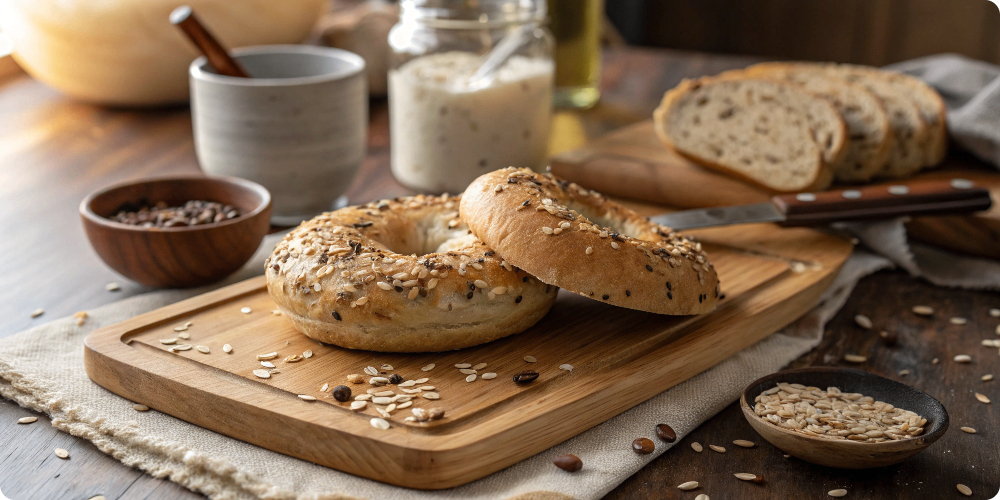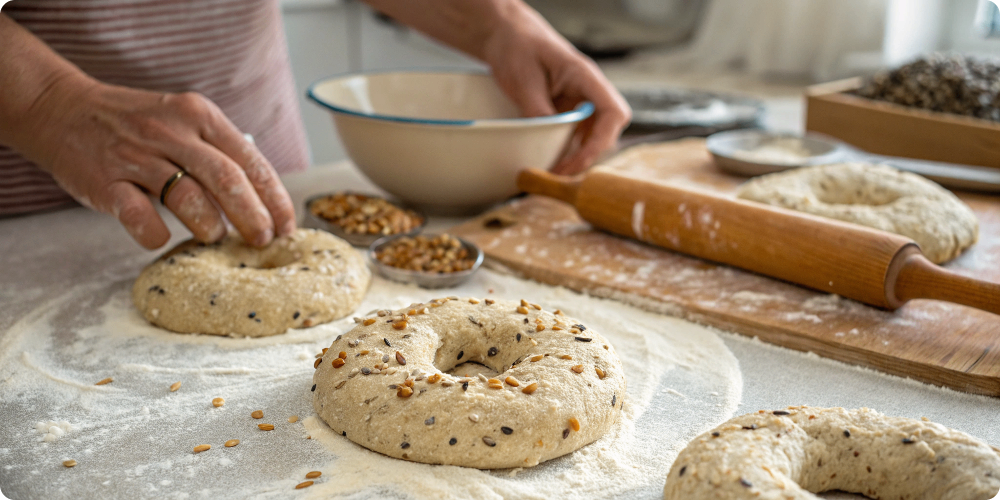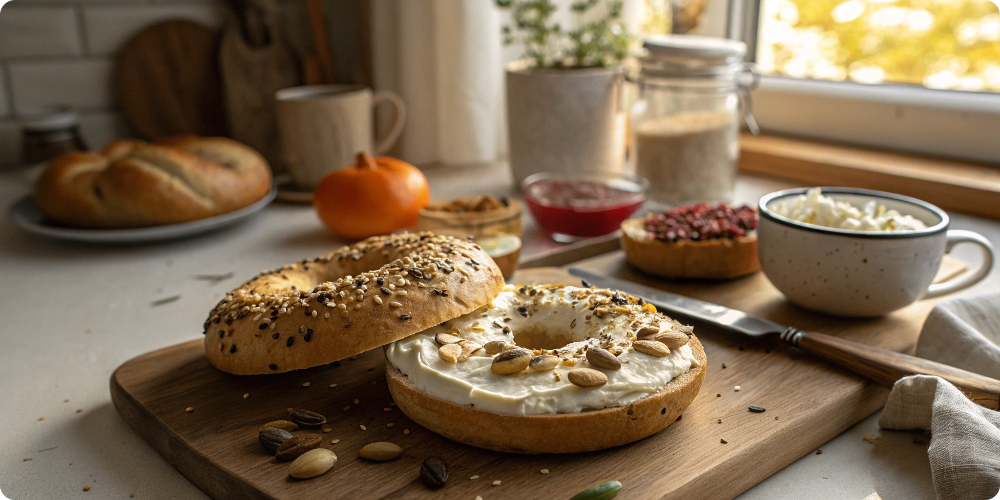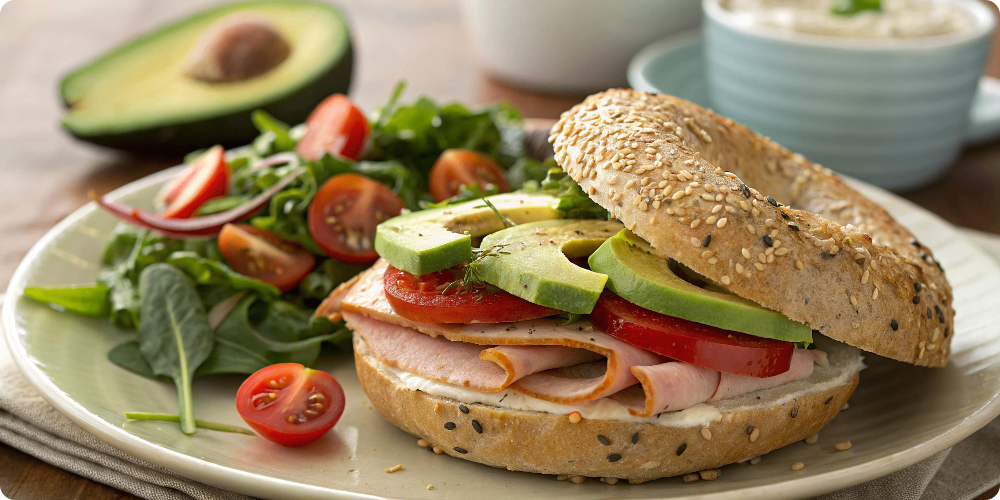Multigrain Bagel
Multigrain Bagel: Nutritious, Hearty, and Surprisingly Easy to Enjoy
There’s something deeply satisfying about biting into a warm, toasted multigrain bagel. It’s chewy, a little nutty, and just textured enough to make your morning feel elevated, even if breakfast only takes five minutes.
At Tasty Plated, Chef Rachael loves creating real-food recipes that strike a balance between nutrition and comfort. And multigrain bagels hit that sweet spot: made with a mix of whole grains and seeds, they’re a more wholesome alternative to plain bagels without sacrificing the bakery-level chew and golden crust.
Whether you’re picking them up from the store or baking your own batch at home, multigrain bagels deserve a spot in your rotation, from breakfast toast to sandwich superstar.
• What Is a Multigrain Bagel?
A multigrain bagel is a bagel made with two or more types of grains, often a blend of whole wheat flour, oats, rye, barley, flaxseed, and other nutrient-dense additions. The outer crust is typically sprinkled with seeds or grains, giving it a beautiful texture and hearty bite.
Common grains and seeds found in multigrain bagels:
Whole wheat flour
Rolled oats
Flaxseeds
Sunflower seeds
Barley flakes
Millet or chia seeds
While it may look rustic, a good multigrain bagel is anything but dry. It’s chewy, earthy, and often slightly sweet, perfect for those who like their carbs with a little more character.

• Ingredients That Make a Great Multigrain Bagel
Making a multigrain bagel at home? It starts with a good flour base, then builds from there with seeds and grains that add flavour and texture.
Basic Ingredients:
Bread flour or high-protein all-purpose flour
Whole wheat flour
Warm water and yeast
Honey or maple syrup (just a bit for balance)
Salt
Rolled oats, flaxseed, sunflower seeds, chia
Some bakers soak the seeds beforehand to keep the texture softer inside. Others press them into the crust just before baking for that classic crunch.
• How to Make a Multigrain Bagel at Home
Yes, you can make bagels from scratch, and it’s easier than you think. The key steps are mixing, rising, shaping, boiling, and baking.
Step-by-step instructions:
Mix the dough
Combine flour, warm water, yeast, salt, and sweetener. Knead until smooth. Add grains last so they don’t tear the dough.Let it rise
Cover and let the dough rise for 1–1½ hours, until doubled.Shape the bagels
Divide the dough into equal balls, then poke a hole in the center and stretch to form a ring.Boil before baking
Boil each bagel in water for 30–60 seconds per side. This gives it that signature chewy crust.Add toppings and bake
Press into extra seeds or oats, then bake at 425°F (220°C) for 20–25 minutes until golden brown.

• Chef Rachael’s Tips: Texture, Toasting, and Toppings
Chef Rachael believes that texture is what sets a great multigrain bagel apart. She uses a mix of soaked and dry seeds to create that chewy-soft interior with a nutty crust.
Rachael’s top tips:
Soak flax, chia, or oats in warm water for 10 minutes before mixing
Use malt syrup or honey in the dough for slight sweetness
For crust: brush with egg wash before baking, then dip into a seed mix
Toast gently and top with softened butter, cream cheese, or smashed avocado
“Multigrain bagels don’t need a lot, they bring so much flavour on their own. But a swipe of cream cheese and some fresh herbs? That’s heaven,” says Chef Rachael.

• Table: Multigrain vs Plain vs Whole Wheat Bagels
| Feature | Multigrain Bagel | Plain Bagel | Whole Wheat Bagel |
|---|---|---|---|
| Grains Used | Mix of oats, flax, wheat | White flour only | Whole wheat flour |
| Texture | Hearty, nutty, chewy | Soft, smooth, fluffy | Dense, chewy |
| Flavor | Earthy, slightly sweet | Mild, neutral | Nutty, slightly bitter |
| Best For | Breakfast or sandwiches | Cream cheese or spreads | High-fiber breakfast option |
| Nutrition (avg) | Higher fiber & protein | Higher carb, lower fiber | Moderate fiber, more filling |
• Serving Ideas, Storage, and Meal Prep Tips
Great ways to enjoy a multigrain bagel:
Toasted with butter or ghee
Cream cheese + cucumber + dill
Smashed avocado + red pepper flakes
Egg + turkey + spinach for a breakfast sandwich
Storage tips:
Keep bagels in a sealed bag or container at room temp for 2–3 days
Slice and freeze extra bagels for easy weekday toasting
Reheat in toaster or warm oven at 350°F for 5–8 minutes
Meal prep idea:
Bake a batch on Sunday
Slice and freeze individually
Use throughout the week for fast breakfasts or sandwiches

• FAQs About Multigrain Bagels
1. Are multigrain bagels healthier than plain?
Yes, usually. They often have more fiber, protein, and nutrients thanks to whole grains and seeds.
2. Can I make them gluten-free?
Yes, use a gluten-free flour blend with xanthan gum and mix in gluten-free seeds like chia or flax.
3. Are they good for weight loss?
They can be. When made with whole grains and paired with protein or fat, they keep you fuller longer.
4. How many carbs are in a multigrain bagel?
On average, 35–45g carbs per medium bagel, but higher in fiber than plain ones.
5. What spreads go best?
Cream cheese, nut butter, hummus, or smashed avocado with salt and lemon juice.
6. Can I make mini versions?
Absolutely. Just divide the dough into smaller balls, shape, boil, and bake, perfect for snacking.
• Final Crumb: A Better Bagel, Bite for Bite
A multigrain bagel brings more than just flavour to your plate, it brings texture, nutrition, and a little something extra that you don’t get from a plain white bagel.
With Chef Rachael’s real-food approach, you can feel good about biting into a breakfast that’s hearty and homemade, or building a lunch sandwich that satisfies with every grain-packed bite.
From scratch or store-bought, toasted or stacked, this bagel’s here to stay.